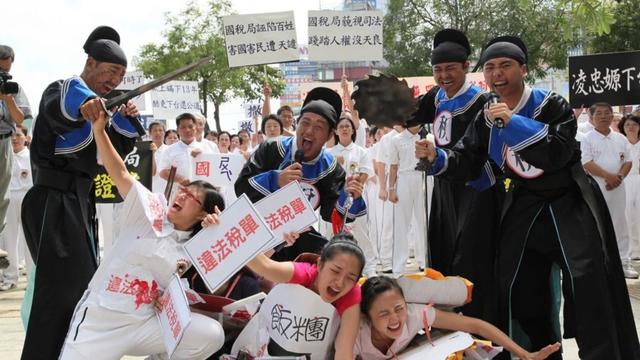Practicing “Zero Discrimination” towards all, rivals and persecutors included, is what Tai Ji Men teaches and does.
by Marco Respinti*
*A paper presented at the webinar “Zero Discrimination for Tai Ji Men,” co-organized by CESNUR and Human Rights Without Frontiers on March 1, 2023, United Nations Zero Discrimination Day.

“Zero Discrimination” is a concept with an universal application. No individual and no human group should ever be discriminated, for whatever reason. It should not, for a simple reason. All human beings have a dignity that derives from human nature, which entitles them to unalienable rights that no power has the right to curtail or deny. No human being can be discriminated—simply because we are all human beings. Humanity is the necessary and sufficient reason to forbid and prevent discrimination against fellow women and men.
The invaluable preciousness of the concept of “Zero Discrimination” is rooted in, and defined by, the dignity of every human person—in all time and all places. “Zero Discrimination” is not a concession graciously granted to a specific individual or a particular group. It does not simply mean tolerating choices, wills, or inclinations—and I already had the opportunity in another webinar to reflect upon the limitations of the concept of mere “tolerance.”
“Zero Discrimination” is the tangible measure of our love for the insuppressible and irreducible humanity that defines every human being who ever lived on earth. This is why “Zero Discrimination” is all more important a policy to observe and implement toward those individuals or groups that differ or even are at odds with our choices, wills, and inclinations, or those of whatever organized group we may belong to.
“Zero Discrimination” is the material expression of the supreme commandment of love: to love our neighbors as ourselves for their humanity, whoever our neighbors are, wish, do, or hate. It includes loving people who annoy, disturb or do harm to us, our enemies included. It is in fact not a matter of what the others do or do not do, wish or do not wish, say or do not say, preach or do not preach: it is a matter of who they are—human beings. Both chronologically and logically, who they are precedes what they do, wish, say, or preach. It is human and inherently moral to practice “Zero Discrimination” because the value of a human being is something that can never be discriminated against, whatever we think of what an individual or group do, wish, say, or preach.
“Zero Discrimination” is then a precious exercise in ascetic—a word that indicates the continuous and constant practice of virtues—, and one that every human being needs to perform. It is much more effective when it is applied to those we do not agree with or dislike.

For this reason, “Zero Discrimination” is also connected to freedom of religion or belief and the Tai Ji Men case.
It is normal and easy to love those who belong to our group. We are even prepared to tolerate some trespasses for the sake of friendship and commonality. Much more difficult, or even heroic, is to love those who belong to a rival group, and may harass or persecute us. A serious advocate for freedom of religion or belief, however, should defend the right to believe and the right to truth, i.e., the substance of religious freedom, even of those who belong to rival groups, or harass and persecute. We do not defend their right to harass or persecute—there is no such right—but their right to profess and express their beliefs.
Coming to the Tai Ji Men case, the behavior of this spiritual movement after almost 27 years of persecution based on fake news, fabrications, and lies is exemplary. The Shifu, or Grand Master, and dizi, or disciples, of Tai Ji Men suffered and suffer a wide range of abuses, yet they still love their persecutors as human beings. For more than a quarter of a century, they have been harassed by corrupt bureaucrats from some branches of the Taiwanese government, yet they have always been and remain good patriots. They just want to be recognized as good people, and freed from the evils that have been vested on them. Their actions, claims, and stubbornness in not accepting easy compromises are aimed at contributing, peacefully, to building a true democracy in Taiwan, in an area where democracies are rare.
There is one seminal reason why it is an inherent part of freedom of religion or belief that no discrimination should be allowed against any individual or group, rivals and persecutors included, while firmly and uncompromisingly demanding justice. And Tai Ji Men Shifu and dizi never discriminated against those who mistreated them, while firmly and uncompromisingly demanding justice.
This reason is that even the most evil person should never be discriminated against as a person. It is the evil that human beings perpetrate that should be discriminated against.
Probably, the most lucid definition of this principle was given by the Roman Philosopher Marcus Tullius Cicero (106–43 BC): “For, even then he had the light of reason deduced from the nature of things, that incites to good actions and dissuades from evil ones. And this has the force of a law, not from the time it was written, but from the first moment it began to exist. Now, this existence of moral obligation is coeternal with that of the divine mind. Therefore the true and supreme law, whose commands and prohibitions are equally infallible, is the right reason of the Sovereign Deity” (“De legibus” II, 10).

The only reality we should discriminate against is evil. On the UN Zero Discrimination Day, this is my proposal for a greater understanding of the peculiar concept that gives its name to this day of observance. “Zero Discrimination” should serve as a general framework for all cases, with the presumption of being universal, therefore valid always and everywhere, for any individual or any human group.
Source: Bitter Winter

